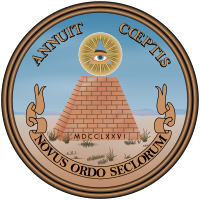
Photo from wikipedia
This special issue contains six articles selected from submissions to the journal track of the 29th International Conference on Inductive Logic Programming (ILP 2019). ILP is a type of symbolic… Click to show full abstract
This special issue contains six articles selected from submissions to the journal track of the 29th International Conference on Inductive Logic Programming (ILP 2019). ILP is a type of symbolic machine learning in which logic of first or higher order is used to represent both the data, and the models (theories) learnt. The main conference was held in Plovdiv, Bulgaria over three days, 3–5 Sep 2019, and was followed by two tutorials on 6 Sep 2019. The articles here reflect some of the salient topics of current interest to the community. In particular, learning in higher-order logics has recently demonstrated some important advantages over the traditional first-order setting, providing facilities for predicate invention and more flexibility in the representation of background knowledge. There are two articles in this issue concerned with the topic. Learning higher-order logic programs by A. Cropper, R. Morel, and S. Muggleton introduces inductive techniques for the said goal by extending the recent framework of meta-interpretive learning. The authors show that compared to learning first-order programs, learning higher-order programs can significantly improve predictive accuracy and reduce learning times. The second article, entitled Logical reduction of metarules by A. Cropper and S. Tourret considers metarules, which are second-order Horn clauses, as a way to define the structure of learnable programs and thus the hypothesis space. The authors study whether fragments of metarules can be logically reduced to minimal finite subsets and propose a new reduction technique called derivation reduction, which is based on SLD-resolution. The technique is shown to outperform alternative methods using subsumption and entailment on the task of reducing metarule sets. This article also received the ILP 2019 conference Best Paper Award, which was chosen among the long conference track papers and the papers accepted in the journal track. This award was kindly sponsored by Springer. The next two articles demonstrate innovative applications of ILP in other fields of artificial intelligence. In particular, in the study Constructing Generative Logical Models for Optimisation Problems using Domain Knowledge, A. Srinivasan, L. Vig and G. Shroff
Journal Title: Machine Learning
Year Published: 2020
Link to full text (if available)
Share on Social Media: Sign Up to like & get
recommendations!